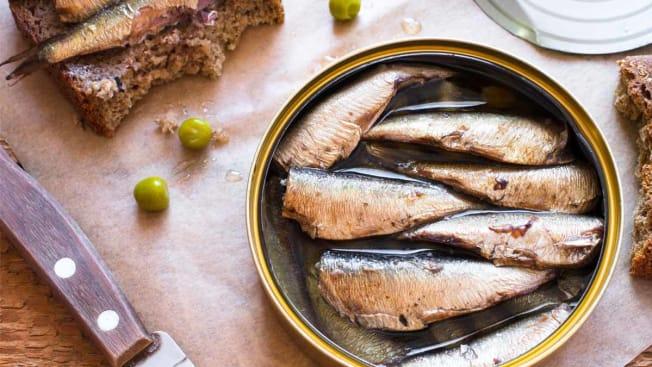There’s a lot to love about these small fish

By Larissa Zimberoff
Americans buy food based on three factors: price, taste, and convenience. But there are newer essentials we’re tracking, including health and sustainability. To find items that hit every metric is a tall order, but sardines surely top the list.
First, let’s meet the sardine. Sardine is the general term used for several species of small, oily fish in the herring family. You can buy them fresh, but they’re easier to find in cans packed in oil (usually olive oil), water, or tomato sauce, with about three to five fish per can. Though you may have memories of cans containing whole fish, in most instances, the heads and tails are removed these days. (Less to get stuck in your teeth.) You can also buy boneless, skinless sardine filets.
Now that you’ve met them, know that sardines are wonderfully nutritious.
Sardine Nutrition
“Sardines can be a good source of nutrients including protein, calcium, and healthy fats such as omega-3s,” says Lona Sandon, a registered dietitian and an associate professor in the department of clinical nutrition at the University of Texas Southwestern Medical Center in Dallas.
Sardines’ soft bones are edible, and that’s where much of their calcium comes from. For instance, 3 ounces (one tin, drained) of King Oscar Wild Caught Sardines in Extra Virgin Olive Oil has about 20 percent of the daily value for calcium, which is 1,300 mg. The company’s boneless, skinless sardines in olive oil have only 6 percent of the daily value in that same size serving.
Vitamin D, another nutrient many of us are lacking, is plentiful in sardines. You get anywhere from 15 to 70 percent of the 20-microgram daily value in 3 ounces, depending on the species of fish.
Perhaps sardines’ biggest nutritional contribution, though, is their omega-3 fatty acid content. Sardines are among the fish with the highest amounts of these essential fats, which have been shown to protect against blood clots that can cause a heart attack or stroke. They may also lower blood pressure, triglycerides, and inflammation. Three ounces will give you about 1 to 2 grams of omega-3 fatty acids. Experts suggest that adult women get 1.1 grams per day and men 1.6 grams. (There’s no upper limit, Sandon says.) Omega-3s from fish and algae are better absorbed than omega-3s from plant sources like chia or flaxseed, and they’re preferred over fish oil supplements.
Sardines are a win-win for Sandon. “The benefit of getting omega-3s from food sources is the other healthy nutrients that come with it, such as protein and B vitamins,” she says.
She also points out that “smaller fish [like sardines] tend to have lower levels of pollutants such as mercury,” which we need to be mindful of in our big fish consumption—namely when it comes to tuna, swordfish, and sea bass. High levels of mercury can lead to fatigue, muscle weakness, and organ damage. Even low levels of the element in the body are tied to impaired brain function.
Sardines are a good option for pregnant people, who need to eat fish to provide the baby with omega-3s, but also need to keep mercury levels low. Omega-3s during pregnancy have been linked to brain development, better cognitive performance, and a lower risk of insulin resistance (which can raise the risk of type 2 diabetes and cardiovascular disease) in children.
Sardine Sustainability
Currently, the Monterey Bay Aquarium’s Seafood Watch lists sardines as an underutilized resource for fish consumption, and many brands are given a resounding recommendation to buy.
Seafood Watch develops its ratings based on four areas. The health and quantity of the fish itself, how fishing methods affect other surrounding species, whether catch limits are imposed and enforced to maintain a healthy population size, and whether fishing methods cause pollution to coral reefs or damage habitats on the seafloor.
Sardines score well in many of these areas. They’re solely wild caught (vs. being farmed) and generally reproduce a few times per season, which helps keep their numbers steady. In a recent study published in the journal Environmental Research Letters, researchers compared the nutritional quality of various foods (fish, beef, poultry, grains, vegetables, etc.) with the amount of greenhouse gases created in their production. They found that small fish like sardines were the most nutritious and among the most environmentally efficient, with small fish having an environmental impact as low as root vegetables and grains.
One reason may be that sardines are mostly caught using purse seines, which are nets that are thrown close to the surface of the water encircling a single-species school of fish. Purse seines are one of the most fuel-efficient methods of harvesting fish. Additionally, nets like these have low levels of bycatch (the capture of unwanted species) and don’t damage the ocean floor.
How to Eat Sardines
Canned fish, like sardines, have become increasingly popular (CR recently did a taste test of sardines and other canned fish). But people who haven’t tried sardines tend to think of them as a bit off-putting. It’s true that sardines have a fishy smell and flavor, but they’re milder than their reputation would suggest. And some companies have made an effort to find sardines that have a wider appeal.
For example, when Bill Carvalho, founder and president of Wild Planet Foods, began canning sardines, he wondered whether he could find a sardine that was “more pleasant to eat without scales.” He found it at a fishery in Japan that catches a light sardine with scales that come off easily.
When you use sardines as an ingredient in cooking, say, in pasta dishes, they add a rich umami flavor. Because the flesh is soft it flakes easily, while the oily meat delivers big on flavor. Sardines don’t need to be cooked; eat them straight out of the can or add them directly to dishes.
Inspired by a snack he ate at a pintxo bar in Spain’s Basque country, Ryan Pollnow, co-chef at the San Francisco restaurant Flour + Water, will grab a single sardine from a can, add a drizzle of olive oil, a squeeze of lemon juice, a swipe of aioli, and whatever fresh herbs he has in the house—such as parsley, chive, basil, or chervil. Pile that all atop a toasted baguette slice and you’re done.
One of Pollnow’s favorite home recipes is pasta alla puttanesca. “I’ll do a version with tinned sardines,” he says. The recipe calls for anchovies, but sardines are much meatier. “I’ll build the sauce, and instead of the anchovies in the beginning, once the pasta is in the sauce I’ll flake sardines on top and it’s more like a seafood pasta,” he says.
During tomato season, try half-inch-thick slices topped with coarse sea salt, black pepper, and flaked sardines. Then pour cooked white beans doused in extra virgin olive oil, a finely chopped garlic clove, and red wine vinegar over the tomatoes. Add garlic breadcrumbs if you like.
Another idea: You can make a sardine tostada with avocado and lime and cabbage slaw spread on tostada rounds, topped with canned sardine filets. Make the slaw with green cabbage and jalapeño dressed in chipotle mayo and lime juice. Garnish with fresh cilantro.
Canned sardines can also become a quick dip for cut vegetables. If you eat dairy, 8 ounces of cream cheese, a 4-ounce can of sardines (drained), minced onions, lemon, Italian flat parsley, salt, and pepper. For a nondairy option, whip 1 cup of cooked potatoes, a 4-ounce can of sardines (drained), olive oil, garlic, salt, and lemon juice. Both are wonderfully rich and creamy.
Delicious, nutritious, planet-friendly. Sardines really do tick all the boxes.
Consumer Reports is an independent, nonprofit organization that works side by side with consumers to create a fairer, safer, and healthier world. CR does not endorse products or services, and does not accept advertising. Copyright © 2023, Consumer Reports, Inc.
This content was originally published here.

















![Fasting Lifestyle [Summit] Free And Online March 20-26 | Holistic Health Online](https://thehealthandwellnesscrier.com/wp-content/uploads/2023/03/Fasting-Lifestyle-Summit-Free-And-Online-March-20-26-Holistic-Health-Online.jpg)

